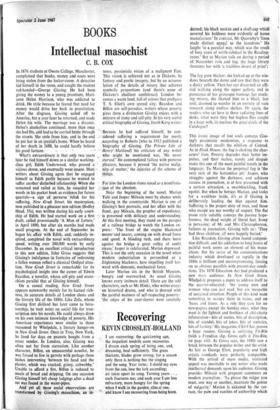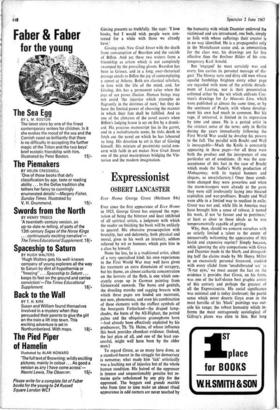Intellectual masochist BOOKS
C. B. COX
In 1876 students at Owens College, Manchester, complained that books, money and coats were
being stolen from the locker-room. A detective hid himself in the room, and caught the student red-handed—George Gissing. He had been giving the money to a young prostitute, Mari- anne Helen Harrison, who was addicted to drink. He stole because he feared that need for money would drive her back to prostitution. After the disgrace, Gissing sailed off to America, but a year later he returned, and made Helen his wife. The marriage was a disaster. Helen's alcoholism continued; more than once she had fits, and•had'to be'carried hbrile thiough the streets. She stole from him, and in the end he put her in an inyalid's home. When he heard
of her death in 1888, he could hardly believe his good fortune. • . t ' ' •
What's extraordinary, is that only two years later he tied himself down to a similar working- class girl, Edith Underwood, who proved a" vicious shrew, and eventually went insane. Most writers about Gissing agree that he engaged himself to Edith liartlY because' he wanted to suffer another disturbed' relationshiti. When' she screamed and railed at him, ihe recorded her words in his pocket book as evidence,for future quarrels—a sign of perverse 'relish for his suffering. New &rub Street, his masterpiece, now published in a-pleasant new edition (Bodley Head, 35s), Was Written during his early court- ship of Edith. He had started work on' a first draft, called provisionally •`A Man of Letters,' in April 1890, but after six months had made small progress. At the end of September he began his affair with Edith, and,- suddenly 'in- spired, completed the novel with extraordinary, speed, writing over 200,000 words by early December. In an excellent critical introduction to this new edition, john Gross suggests that Gissing's indulgence in fantasies of redeeming a fallen woman reflect a classical Oedipal situa- tion. New \Grub Street is remarkable for its psychological insight into the career of Edwin Reardon, a novelist, whose self-pity and maso- chism parallel that of Gissing himself.
On a casual reading, New Grub Street appears noteworthy mainly for its factual rich- ness, its accurate details of London slums and the literary life of the 1880s. Like Zola, whom Gissing first disliked but later came to hero- worship, he took notes on social life for tran- scription into his novels. He could always draw on his own intimate knowledge of poverty. His American experiences were similar to those recounted by Whelpdale, a literary hanger-on in New Grub Street. Once in Troy, New York, he lived for days on peanuts bought from a street vendor. In London, also, Gissing was often not far from starvation. Like another character, Biffen, an unsuccessful novelist, he was forced to live in garrets with perhaps three inches intervening `between his head and the plaster, which was cracked, grimy, cobwebby.' Unable to afford a fire, Biffen is reduced to meals of bread and dripping. On one occasion Gissing himself left cheap lodgings after a dead rat was found in the water-pipes.
And yet all these social observations are transformed by Gissing's masochism, an in-
tense, pessimistic vision of a malignant Fate. This vision is achieved not as in Dickens, by fantasy and poetic imagery, but by an accumu- lation of the details of misery that achieves symbolic proportions (and there's none of Dickens's ebullient confidence). London be- comes a waste land, full of echoes that prefigure T. S. Eliot's own unreal city. Reardon and Biffen are self-parodies, writers whose poverty gives them a distinction Gissing enjoys with a mixture of irony and self-pity. In his very useful critical biography of Gissing, Jacob Korg writes: ''Becattie he had suffered himself, he con- ; sidered• suffering a requirement for merit; , according to Roberts [who in 1912 published a biography of Gissing, The Private Life of • Henry! Maitland] his criticism of any writer who -might be mentioned was, `He never , starved.' He contemplated failure with perverse ifleasnre, because it proved 'the native malig- nity of matter,' the injustice of the scheme of things.
For him the London slums stood as a manifesta- tion of the absolute.
.Nlar the beginning of the novel, Marian Yule and Jasper Milvain meet by chance while walking in the countryside. Marian is one of Gissing's best portraits, and her affair with the frank, gay Milvain, the prophet of expediency, is presented with delicacy and understanding. At this first meeting, they stand on the parapet of a railway bridge to watch the London ex- press:-.'The front of the engine blackened nearer'and nearer, coming on with dread force and speed. A blinding rush, and there burst against the bridge a great volley of sunlit steam.' Jasper is exhilarated, Marian depressed. This is not the only occasion in the novel when modern industrialism is personified as a .frightening blackness, here impelling itself for- ward with demonic, mechanical force.
Later Marian sits in the British Museum, hungry and• overworked. As usual Gissing knows every intimate detail. There are the odd characters, such as Mr Hinks, who writes essays on historical drama, and who is dressed with the painful neatness of self-respecting poverty: `the edges of his coat-sleeves were carefully darned; his black necktie and a skull-cap which covered his baldness were evidently of home manufacture.' In contrast, Mr Quarmby's `linen made distinct appial to the laundress.' He laughs 'in a peculiar way, which was the result of long years of mirth-subdual in the Reading- room.' But as Marian toils on during a period of November rain and fog, the huge library threatens her with 'a trackless desert of print': The fog grew thicker; she looked up at the win- dows beneath the dome and saw that they were a dusky yellow. Then her eye discerned an offi- cial walking along the upper gallery, and in pursuance of her grotesque humour, her mock- ing misery, she likened him to a black, lost soul, doomed to wander in an eternity of vain research along endless shelves. Or again, the readers who sat here at these radiating lines of desks, what were they but hapless flies caught in a huge web, its nucleus the great circle of the Catalogue?
This ironic image of lost souls conveys Giss- ing's pessimistic modernism, a response to darkness that recalls the nihilism of Conrad. As in Bleak House, the fog is choking the char- acters' lives. Poverty degrades their better im• pulses, and their malice, vanity and despair make this one of the most painful novels in the language. To Marian the perpetual fog is 'the very reek of the bottomless pit.' Jasper, who struggles against the darkness, and achieves success in journalism, is at first presented with a certain attraction, a swashbuckling, frank egotist. But when he betrays Marian, and looks for a wealthier bride, it's as if Gissing is deliberately loading the dice against him. Suffering is the proper duty of man, and those who escape are not worthy of respect. The flat prose style suitably conveys the passive hope- lessness, the dead weight of literal fact. Irony is pervasive; of Mr and Mrs Christopherson, failures in journalism, Gissing tells us: 'They had three children; all were happily buried.'
Like Reardon, Gissing often found composi- tion difficult, and his addiction to long hours of painful work seems an element of his maso- chism. But his satire of the communications industry which developed so rapidly in the 1880s is brilliant and uncompromising, forcing on us obvious parallels with present-day condi- tions. The 1870 Education Act had produced a new mass audience. In New Grub Street, Whelpdale proposes a paper to address itself to the quarter-educated : 'the young men and women who can just read, but are incapable of sustained attention. People of this kind want something to occupy them in trains, and on 'buses and trams. As a rule they care for no newspapers except the Sunday ones; what they want is the lightest and frothiest of chit-chatty information—bits of stories, bits of description, bits of scandal, bits of jokes, bits of statistics, bits of foolery.' His magazine, Chit-Chat, proves a huge success. Gissing is satirising Tit-Bits (with a Freudian slip, Gross calls it Tits-Bits, on page viii). As Gross says, the 1880s saw a break between the popular writer and the artist. As late as George Eliot, popularity and high artistic standards were perfectly compatible. With the arrival of mass media, restricted appeal was inevitable to any writer who made intellectual demands upon his audience. Gissing provides Milvain with pregnant comments on modern journalism: `To please the vulgar you must, one way or another, incarnate the genius of vulgarity.' Marian is sickened by the ret- race, the pain and vanities of authorship which Gissing presents so truthfully. She says: 'I love books, but I would wish people were con- tented for a while with those we already have.'
Gissing ends New Grub Street with the death from consumption of Reardon and the suicide of Biffen. And yet these two writers form a friendship as artists which is not completely swamped by the prevailing gloom. Reardon has been to Greece, and in a long, over-rhetorical passage extols to Biffen the joy of contemplating a sunset at Athens. Both are classical scholars, in love with the life of the mind, and, for Gissing, this has a permanent value when the joys of sex prove illusion. Human beings may not avoid 'the injustice which triumphs so flagrantly in the destinies of men,' but they do have the limited power of choosing the manner in which their fate shall be fulfilled. And so one of the climaxes of the novel occurs when Biffen's lodging house is set on fire by a drunk- ard. His precious manuscript lies in the garret, and in a melodramatic scene, he risks death to fetch out the novel on which he has laboured so long. His devotion to art is that of Gissing himself. His mixture of pessimistic social con- cern with faith in art makes New Grub Street one of the great masterpieces bridging the Vic- torian and the modern imagination.



































 Previous page
Previous page